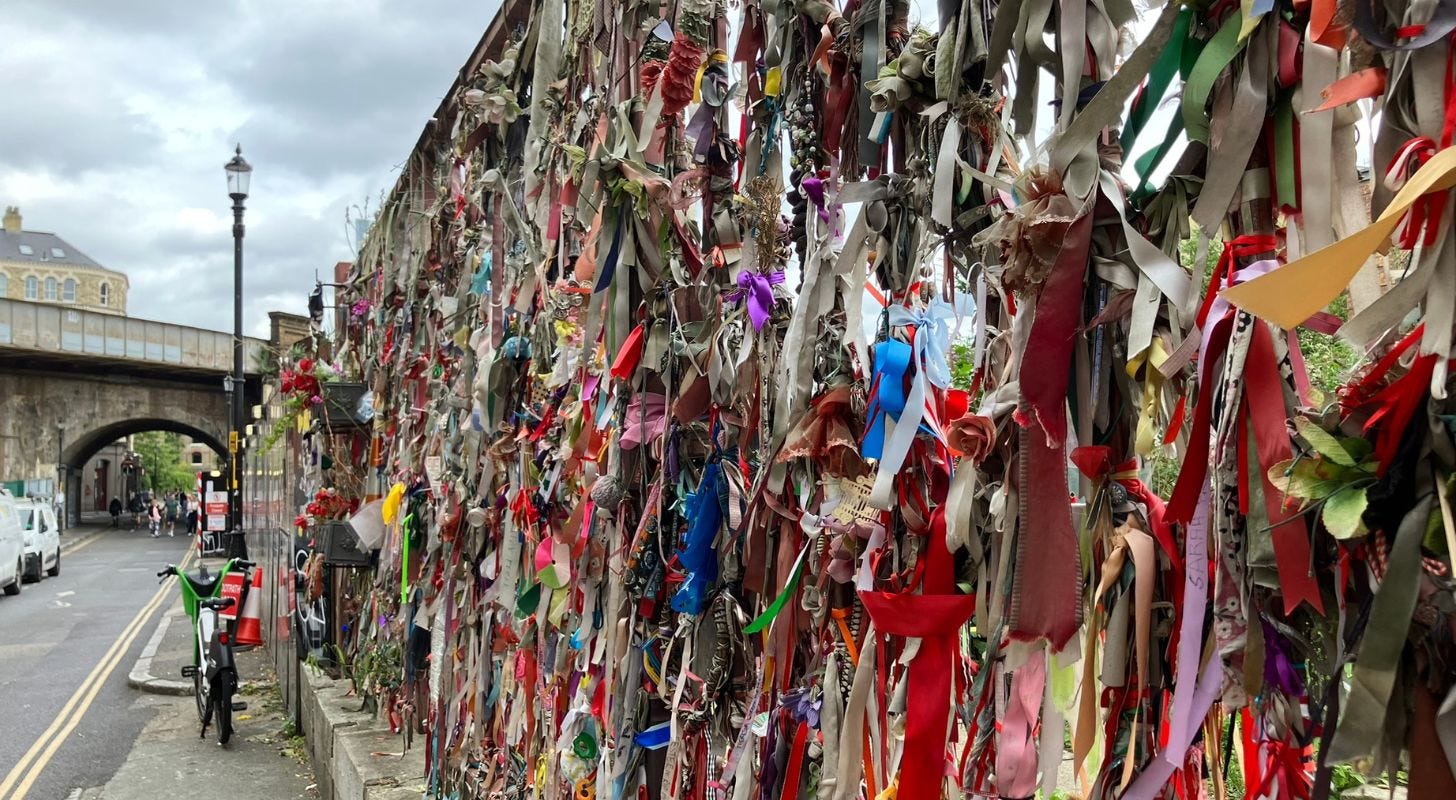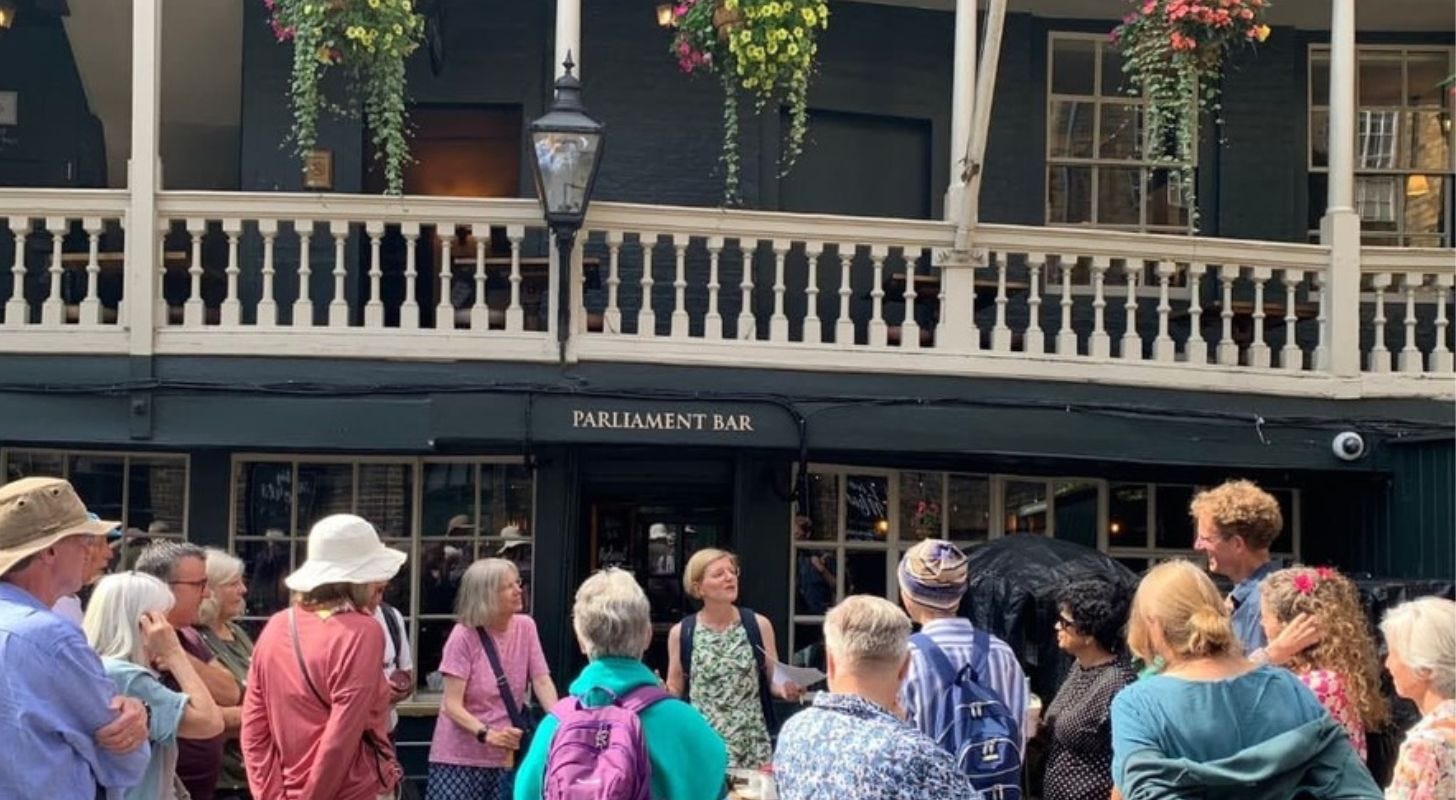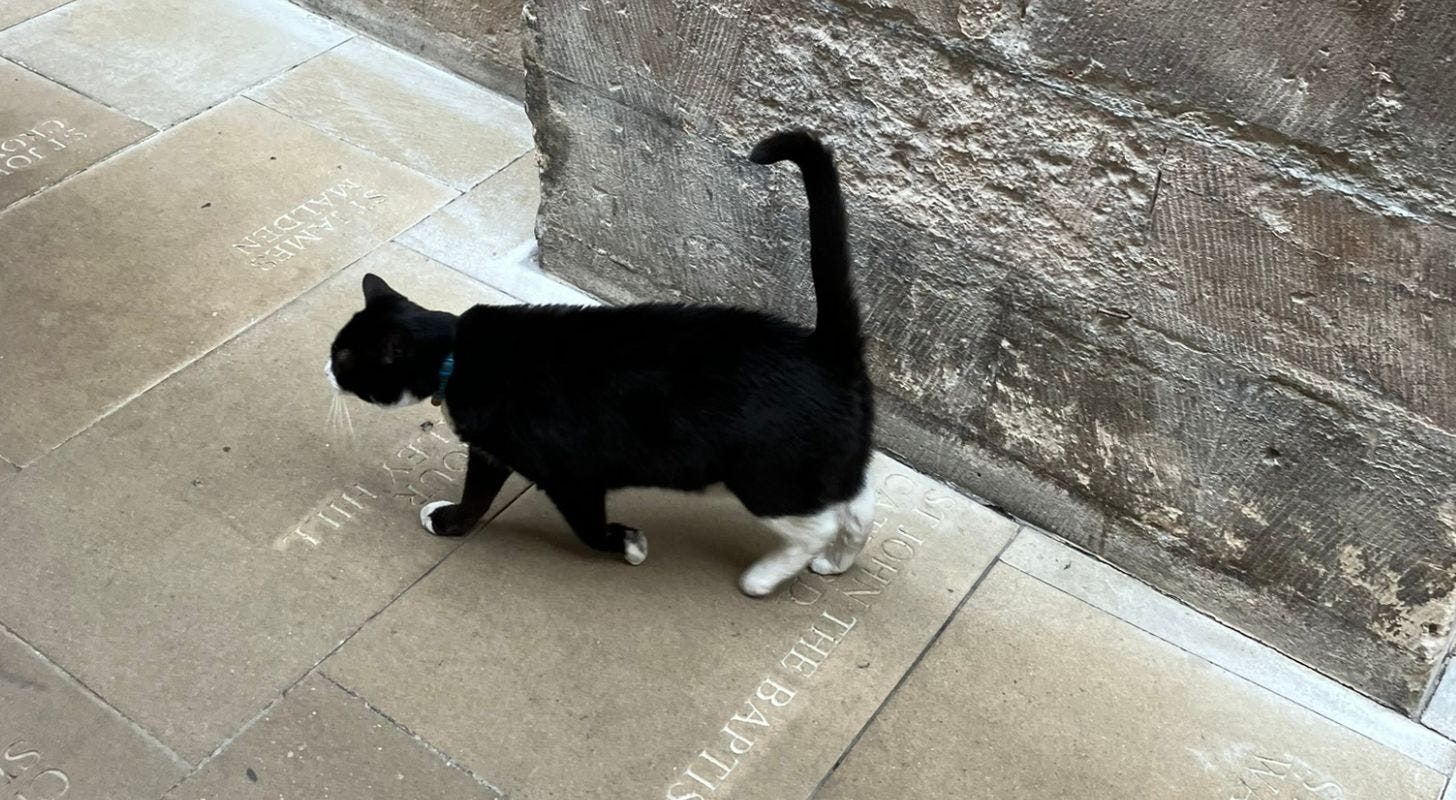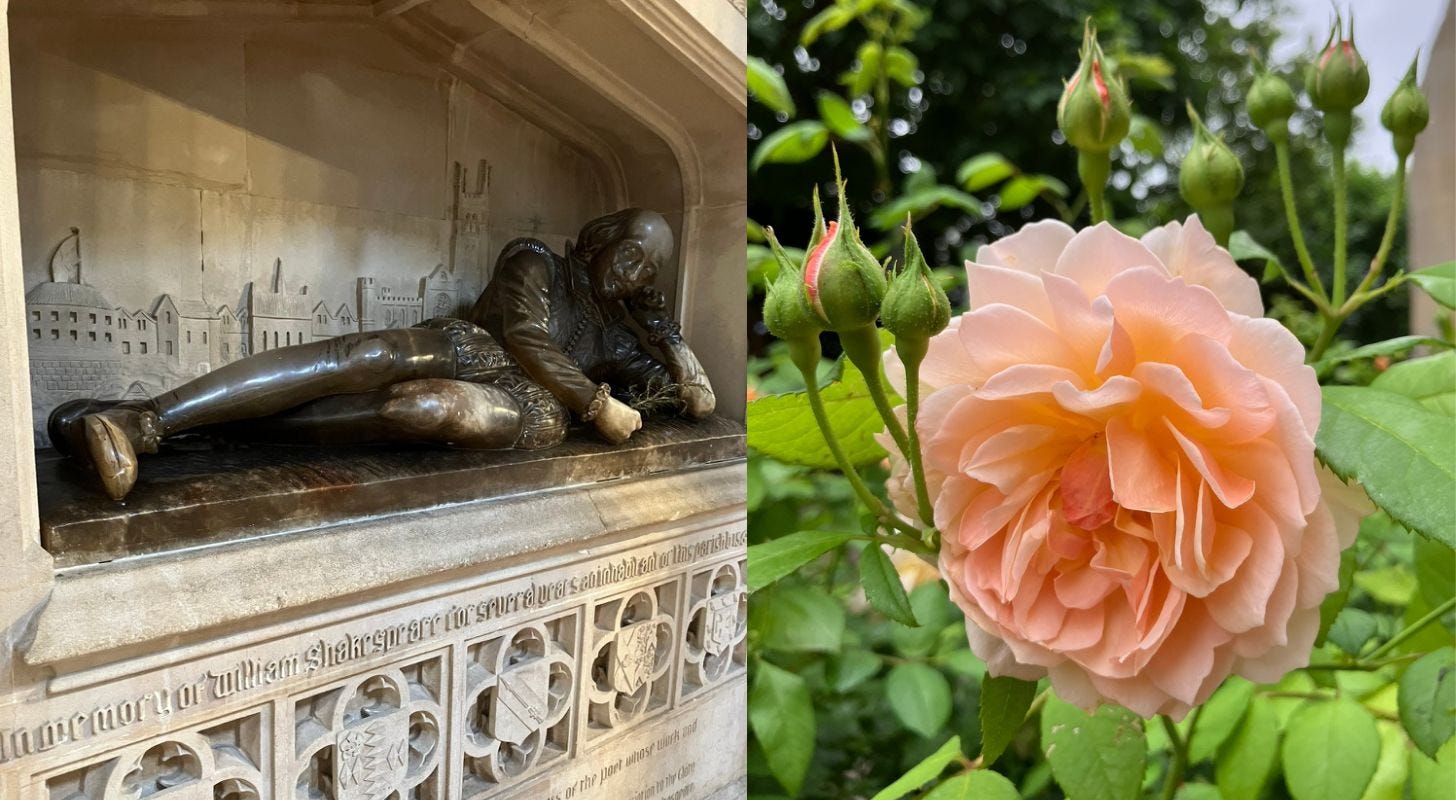‘Tis strange that death should sing.
- King John, Act V, Scene VII - William Shakespeare
In this world of worlds, social conditioning along the lines of gender, class, creed and culture can significantly circumscribe realities, even in death. A single woman working the stews, brothels licensed by the Bishop of Winchester within the Liberty of the Clink from 1149, would be buried in the unconsecrated Cross Bones graveyard. Winchester Geese, named after the venereal goose pimples their ‘bite’ endowed, were financially exploited and consigned to damnation by said Bishops, whose revered bodies were ornately entombed in cathedrals. Today, ribbons of remembrance deck the gates as the outcast dead of Cross Bones are honoured in community ceremonies and performances of John Constable’s Southwark Mysteries. So we discover on a fascinating History Walk of Southwark expertly led by murder mystery author
in aid of Refugee Tales.Our world of worlds is full of reversals, populated with stories of rags to riches where paupers can become Kings and whores Empresses. Emperor Justinian I, (482 - 565AD) a peasant farmer who rose through military ranks to rule the East Roman Empire, changed the law so he could marry actress-prostitute-turned-Empress Theodora. Conversely, the fall from riches to rags, favour to exile, fame to ignominy, power to assassination stalks the trajectory of the mighty, accompanied by the rise and fall of buildings, palaces and monuments. No wonder Shakespeare’s Cardinal Pandulph says Fortune looks upon us ‘with a threatening eye.’ (King John, Act III, Scene 4).
Anna telling tales at The George - Photo Teresa Pilgrim
A host of ghostly ‘fortune’s fools’ (Romeo & Juliet, Act III, Scene 1) trail our footsteps as we explore Southwark’s riverside history. Beyond the boundaries of the City of London, bands of players could reverse and stretch the bounds of real and imaginary worlds. We begin our walk in the courtyard of The George, London’s last remaining galleried coaching inn, stage to many a travelling player. From there we wend our way through Southwark’s streets to tread the cobbles of the original Globe, whose turn on ‘giddy Fortune’s furious fickle wheel,’ (Henry V, Act III, Scene 6) changed the landscape of English theatre forever. Having risen in 1599, the theatre’s fall was dramatic - in 1613 a piece of flaming wadding came loose from a staged cannonball, igniting the thatched roof during a performance of Henry VIII/ All is True. Of an audience of 3000, none were harmed and the rebuilt tiled roof theatre remained active until the English Civil War of 1642. The neighbouring rival Rose Theatre (1587-1605) and its leading playwright, Christopher Marlowe faced a similarly dramatic rise and fall of fortunes.
The famed reversals of Thomas Becket, once-favoured Archbishop, turned rebel-martyr, thread through our tour. We hear how, to assuage the outcry, Henry II dedicated a Chapel to the Archbishop his knights assassinated whilst building a new London Bridge in 1209. We visit the remnants of Winchester Palace, which included the notorious Clink Prison and a 'stew’ for the Winchester Geese, where Becket spent his last night on earth. As martyrdom endowed medieval celebrity status, monks at a former incarnation of Southwark Cathedral, St Mary Ovarie (which despite religious fetishisation of female virginity actually meant ‘over the river’) christened their infirmary and today’s hospital St Thomas’s in honour of Becket.
A short paws to follow the tall tail of Hodge, the Southwark Cathedral Cat, who helps raise awareness for Catcuddles sanctuary for homeless cats.
‘Fortune brings in some boats that are not steered’ - Cymbeline, Act IV, Scene 3
The reversals of fortune faced by refugees fleeing persecution, wars and natural disasters are compounded by the challenges awaiting on foreign shores. The UK, which receives only 1% of the world’s displaced population, is the only country which locks refugees in indefinite detention. Last year 24,000 people were held in seven Immigration Removal Centres, run by profit-making private companies at £107 per person per day. A 2018 Guardian survey of detainees found that 56% were at severe risk, with 2 suicide attempts made per day. In 2019 the government refused a recommended 28-day limit on detention by the Joint Committee of Human Rights.
Once released from detention, people applying for refugee status and leave to remain are not allowed to claim benefits or work, rendering them dependent on the state, unable to pursue former careers or integrate effectively into society. Whilst the majority of people arriving in small boats are refugees, who, it is legally recognised, may have to break the law to reach safety, tabloids blare misinformation about a ‘crisis of illegal immigrants coming to steal our jobs/ benefits.’ Even when it is admitted that immigration ‘enriches’ UK society, migrants are welcome only as capital. This politically expedient scapegoating, persecution and exploitation of ‘the other’ is, of course, a path well-trodden by rulers throughout history.
Photos: Winchester Palace - photo Teresa Pilgrim, Red Cross Cottage Gardens
You think your pain and your heartbreak are unprecedented in the history of the world, but then you read. It was Dostoevsky and Dickens who taught me that the things that tormented me most were the very things that connected me with all the people who were alive, or who ever had been alive. Only if we face these open wounds in ourselves can we understand them in other people. An artist is a sort of emotional or spiritual historian. His role is to make you realize the doom and glory of knowing who you are and what you are.
- James Baldwin - LIFE Magazine, May 24, 1963
We pause to reflect on the purpose of our walk in the quiet refuge of Red Cross Cottage Gardens, just a turn away from the hurly-burly of streets that have known war, fire, plague and poverty. Anna’s History Walk is one of a year-long series of events marking the 30th Anniversary of the Gatwick Detainees Welfare Group. Through Refugee Tales, they tell stories of people held in immigration detention and those who work with them. Patron Ali Smith describes storytelling as ‘an act of profound hospitality… a welcoming-in.. a porous artform where sympathy and empathy are only the beginning of things.’ A humane form of imagination, empathy allows us to dreamwalk in another person’s shoes when we hear their story.
It feels all the more important to walk the path of empathy at the end of a week which has seen communities and police mobilising to fend off vicious far-right racist attacks across England and Northern Ireland. Amongst insidious narratives of division, stories of empathic connection and acts of kindness abound, as thousands of people from all backgrounds took to the streets to defend mosques and refugee centres. In a courageous display of empathy, Liverpudlian Imam Adam Kelwick opened the doors of Abdullah Quilliam Mosque and invited his attackers to ask questions and share food. Reflecting on the events
writes: ‘Some things may have stayed the same, but some things have changed, and there is a kernel of hope in that, however small.’ - I'm just trying to get home.Shakespeare’s Memorial and The Rose Garden, Southwark Cathedral
What racism breaks apart, the art of storytelling brings together.
And it is for this reason that I believe, literature is the art of radical empathy.
A Dreamers Dream Walk with Dickens -
The magical art of storytelling allows us to welcome, learn and recognise shared elements in other people’s experiences - real or imagined, historical or contemporary. Through stories we learn that reversals of fortune are part of the human experience - ‘what’s past is prologue’ (The Tempest Act II, Scene 1) to the next turn of Fortune’s wheel. At times, forces beyond our control circumscribe our realities and ‘it boots not to resist both wind and tide.’ (King Henry VI, Part III, Act IV, Scene 3) At other times we have agency within circumstances - ‘our remedies oft in ourselves do lie/ Which we ascribe to heaven: the fated sky.’ (All’s Well That Ends Well) The ancient principle of hospitality calls on those enjoying better fortunes on home shores to listen for the tales arriving on the wind and tide and extend an empathic refuge to those fleeing challenging reversals.
With thanks to:
, Teresa Pilgrim, Gatwick Detainees Welfare Group and Refugee Tales









Thank you Katie for a moving reflection on my Southwark history walk, and the reasons behind it.
Just somewhat belatedly watched this video about the Here Lay Your Hearts project in Southwark which shows Crossbones Graveyard - https://youtu.be/30wJNAoXlGI?si=2yr6waauNSLjCfr3